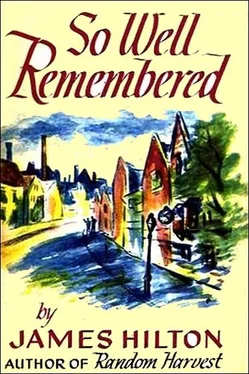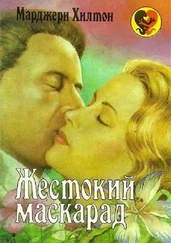Джеймс Хилтон - So Well Remembered
Здесь есть возможность читать онлайн «Джеймс Хилтон - So Well Remembered» весь текст электронной книги совершенно бесплатно (целиком полную версию без сокращений). В некоторых случаях можно слушать аудио, скачать через торрент в формате fb2 и присутствует краткое содержание. Год выпуска: 1945, Жанр: Проза, на английском языке. Описание произведения, (предисловие) а так же отзывы посетителей доступны на портале библиотеки ЛибКат.
- Название:So Well Remembered
- Автор:
- Жанр:
- Год:1945
- ISBN:нет данных
- Рейтинг книги:5 / 5. Голосов: 1
-
Избранное:Добавить в избранное
- Отзывы:
-
Ваша оценка:
- 100
- 1
- 2
- 3
- 4
- 5
So Well Remembered: краткое содержание, описание и аннотация
Предлагаем к чтению аннотацию, описание, краткое содержание или предисловие (зависит от того, что написал сам автор книги «So Well Remembered»). Если вы не нашли необходимую информацию о книге — напишите в комментариях, мы постараемся отыскать её.
So Well Remembered — читать онлайн бесплатно полную книгу (весь текст) целиком
Ниже представлен текст книги, разбитый по страницам. Система сохранения места последней прочитанной страницы, позволяет с удобством читать онлайн бесплатно книгу «So Well Remembered», без необходимости каждый раз заново искать на чём Вы остановились. Поставьте закладку, и сможете в любой момент перейти на страницу, на которой закончили чтение.
Интервал:
Закладка:
And his own first words as he stared at her for the first time: “Aye, that’s me.”
“Then I want to thank you for—for—”
“Oh… so you’re Olivia Channing?”
“Yes, that’s why I want to thank you. It was kind of you to put in a word for me.”
“I didn’t mean it as kindness—just fairness, that’s all. But I’m glad it turned out the way it did. How are you managing?”
“You mean the work? Oh, it’s easy.”
“Like it?”
“Pretty well.”
“Only that?”
She smiled—a curious smile, for which George, who saw it often afterwards, long sought an adjective, and in the end could only use Jordan’s description of the girl—he had said she looked ‘haunted’.
She said now, with this smile: “People don’t like ME, that’s the trouble.”
He smiled back, robustly, cheerfully. “Can’t expect them to, yet awhile. You’ll just have to live things down a bit.”
“Live things down?
“Aye… if you know what I mean.”
He wondered if, or how much, she did, especially as that ended their conversation rather abruptly. She fetched him his book and did not resume it.
After that first meeting he began to feel emotionally the full force of the argument he had stated in abstract terms at the Council meeting— that the child should not suffer for the sins of the father. In this case the sins of the father had been so considerable that the sufferings of the daughter might well be on the same scale unless someone intervened on her behalf; and George, having intervened once, could not help the growth of a feeling of personal responsibility to match his awakening interest. He knew that John Channing had died practically without means, despite the fact that he had lived at Stoneclough from the time of his release from prison until his death; and though the daughter’s need to go out and earn her own living did not stir George to any particular pity (for, after all, that was what most Browdley girls had to do), he was nevertheless concerned that she should be happy in her job, the more so as he had obtained it for her. Not till he met her for the second time did it occur to him to wonder why on earth she had applied for any job at all in a place where there was so much local feeling against her family.
He spoke this thought aloud when (on a bus-top where he found himself next to her) she admitted having encountered a good deal of coldness and even a few personal insults at the Library.
“Then how about giving it up?” he asked, suddenly seeing things from her angle and becoming indignant about them. “Would you be happier?”
“I need the money,” she said simply.
“Aye, but there’d be other jobs in other places—why not try London, for instance?”
“I’d rather stay here.”
“You mean you LIKE Browdley?”
She shook her head.
“Then why?”
“It’s my home—Stoneclough.”
“Stoneclough? You mean the actual house? It means so much to you? You still live there?”
“Yes, it’s my home.”
“I should have thought you’d have been glad to leave a place that had such —er—unhappy associations.”
She shook her head again.
After an awkward pause George continued: “Well, don’t worry. Most people have short memories.”
“I haven’t.”
“Oh, I didn’t mean THAT… I meant other people—they’ll change their minds about you if you stick it out.”
(And yet as he said this he was aware of another phenomenon that became familiar to him later—the ease with which, to her or in her presence, he said things he did not really mean, or that his own judgment did not support. For instance, it simply was not true that Browdley people had short memories—on the contrary, though the Channing crash had taken place a generation before, it was still remembered with bitterness, and the fact that the girl had had unpleasant experiences at the Library proved it.)
She said: “Please don’t think I’m complaining about the job. It was you who asked me what it was like, otherwise I shouldn’t have said anything.”
“Well, I’m glad it doesn’t bother you much. If it does, let me know.”
(But that also was absurd. What could he do, even if she did let him know? Any other job in Browdley would have the same drawbacks, and outside Browdley he had no influence to find her a job at all.)
She said, smiling: “Thanks. It’s very kind of you… I’m afraid this is my stop… Good night.”
It was at the corner where the lane to Stoneclough left the main road. He suddenly realized that and detained her for a few seconds with an astonished: “But—but—are you going home NOW? How do you get there from here?”
“I walk.”
“But it’s three miles.”
“I don’t mind. I love walking… Good night.”
After she had gone and the bus had re-started he began to think it over. Six miles a day on foot oughtn’t to have shocked him (he was a good walker himself and had often, when he was her age, walked to and from jobs to save bus fares), but it was strange to realize that till then he had never wondered how or where the girl did live, travel to her work, and so on. So she was still at Stoneclough?… Too bad there were no other houses in that direction, or he might have asked the Transport Committee, of which he was a member, to start a new bus route.
He met her several times again on that same trip and each time he found himself more interested. Up to a point they seemed to get along excellently; she was quick-minded and charmingly friendly, and when she spoke it was with a sort of grave ardour that made even chatter sound significant; yet beyond that a shadow seemed to fall between them. After thinking it over with some deliberation he decided what the shadow was; it must be the fact (doubtless known to her) that he had publicly attacked her father and family. He was prepared for some inevitable mention of this sooner or later, and planned to be completely frank and outspoken. “Now please,” he would say, “let’s not waste time over that. I said what I meant and I still mean it. But I don’t expect YOU to see things my way—after all, he was your father, whatever else he was.”
But she never gave him the cue. One day, however, he met Dick Jordan in the street again and heard the story of a rather odd incident that had taken place at the Library.
“I was in my office, George, when I heard a bit of a row going on at the counter, so I went out to see what it was, and there was old Horncastle calling the girl names and shouting about her father having ruined him. You know Bob Horncastle?”
Yes, George knew him. He was a gnarled industrial veteran who had lost both job and money in the Channing crash and had lived ever since on the verge of penury, his embitterment becoming a shade nearer lunacy each year. Browdley knew all about him. He was a hard case, but no harder than some others.
“The girl was standing there, George, pale and not saying a word and with that haunted look I told you about, while the old chap poured out a stream of abuse. When he saw me approaching he stopped, and then the girl said very quietly—‘I’m sorry, Mr. Horncastle.’ She had to get his name from the Library card she was holding, and the way she did that—the way she looked down, I mean, and then looked up again and spoke his name… well, it was just like a play, especially when she went on—‘But why don’t you scribble it in the margins of the book, as all the other people do?’ Then she just walked off and left him to me to calm down. Of course there wasn’t much I could say—he’s too old, for one thing, and the way he was carrying on I was afraid he was going to have a heart attack. Finally I got him to go, and then I went back to my office and nearly had a heart attack myself. That kind of thing upsets me.”
Читать дальшеИнтервал:
Закладка:
Похожие книги на «So Well Remembered»
Представляем Вашему вниманию похожие книги на «So Well Remembered» списком для выбора. Мы отобрали схожую по названию и смыслу литературу в надежде предоставить читателям больше вариантов отыскать новые, интересные, ещё непрочитанные произведения.
Обсуждение, отзывы о книге «So Well Remembered» и просто собственные мнения читателей. Оставьте ваши комментарии, напишите, что Вы думаете о произведении, его смысле или главных героях. Укажите что конкретно понравилось, а что нет, и почему Вы так считаете.










